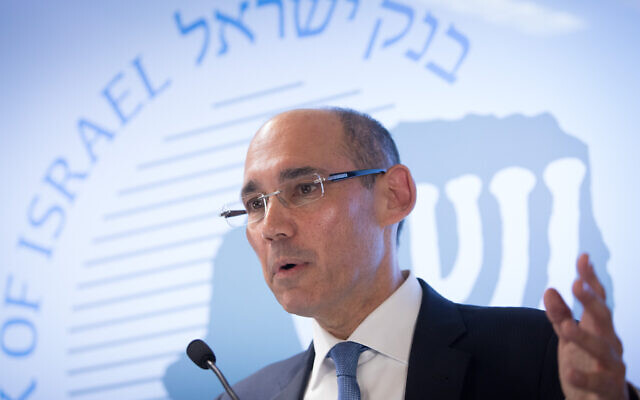The Bank of Israel delivered another large increase to its benchmark interest rate on Monday, hiking it by another 0.75 points to 2.75 percent, as part of the central bank’s efforts in recent months to tamper inflation growth.
Inflation in Israel has reached 4.6% over the past 12 months, as of the most recent research, down from 5.2% calculated in August but still well above the bank’s upper range of 3% projected in January. Inflation in the US has eased to 8.3% in August, down slightly from 8.5% throughout the summer months, and Europe-wide inflation hit 10% in September.
The Bank of Israel’s rate jump comes just over a month after the bank raised the rate to 2%, up from 1.25% in July. It is the fifth rate jump in 2022, the first of which was in April, when the central bank initially raised the key rate from an all-time low of 0.1% — a minimal rate it had kept for several years and throughout the COVID-19 pandemic.
Israel’s current rate is the highest since January 2012, according to Reuters.
The higher rates are designed to restrict the flow of money by making borrowing less attractive, eventually dampening consumer demand, and easing inflationary pressures wrought by an undersupply of goods and an oversupply of cash.
Sign up for the Tech Israel Daily and never miss Israel's top tech stories
Israel’s Consumer Price Index — a measure of inflation that tracks the average cost of household goods like food, clothing, and transportation — dropped by 0.3% in August following an unexpected rise of 1.1% in July, bringing annual inflation to 4.6%, according to the latest figures by the Central Bureau of Statistics.

Bank of Israel Governor Amir Yaron speaks during a press conference at the Bank of Israel in Jerusalem on January 7, 2019. (Noam Revkin Fenton/Flash90/File)
Inflation is still at its highest in over a decade, as Israel also contends with a red-hot housing market that has seen price rises of an annual 17.9%, the fastest in a decade.
In remarks delivered at a press conference Monday, Bank of Israel chief Amir Yaron said that “from a macroeconomic perspective, Israel’s economy is in a good place, certainly relative to that of the other advanced economies.”
However, he warned that inflation “which has surged around the world, and can be seen here as well, even if to a smaller extent compared to worldwide, is a process that adversely impacts the economy, and particularly weaker population groups, and we need to rein it in and bring it back to within the target range.”
Though higher inflation around the world derives from world events such as Russia’s war on Ukraine, which has hit energy prices, supply chain disruption, and a global economic slowdown, Israel also suffers from a host of internal challenges, he noted. These include rising housing prices “which, beyond being an economic problem, is also a significant social issue” and “political uncertainty, the economic ramifications of which include the delays in medium-term and long-term investments.”
Israelis are headed to the polls again in November for the country’s fifth national elections in under four years. An IDI study in June estimated that the cost to the economy of the next election will be nearly NIS 3 billion ($873 million).
Yaron said Israel will also need to advance investment in “infrastructures that are important to economic growth and to increased productivity in coming years.”
Israel ranks low on productivity (estimated by the OECD at 35% lower than the organization’s best performers) driven by the disparity between the celebrated, high-performing tech sector and more traditional sectors, heavily regulated industries such as manufacturing, and widening socioeconomic gaps.
On Israel’s labor market, the bank said it remains tight with employment rates now higher than the average level in 2019 before the COVID-19 pandemic, but with the number of job vacancies still very high, highlighting the ongoing shortage of workers.
In updated projections, the central bank’s Research Department said it forecasts Israel’s GDP growth at 6% in 2022, and by 3% in 2023. It expects inflation to decline to 2.5 percent in 2023, hitting the bank’s target range of 1-3%. The bank had previously forecasted that GDP will grow at a rate of 5% in 2022 and 3.5% in 2023.
According to the new forecast, the benchmark interest rate is expected to hit 3.5% by the third quarter of next year.
Yaron said Israel’s next government, following the November elections will need to quickly pass a state budget and take on necessary reforms and investments “on behalf of the coming generations in order to succeed in ensuring the continued growth of GDP in the future.”
“Uncertainty is not good for the economy, but this uncertainty has been increasing recently in many areas in Israel and abroad. At the same time, Israel’s economy is strong and has proven its ability to grow in the short term even in conditions of uncertainty and global difficulties as well,” said the central bank chief.


